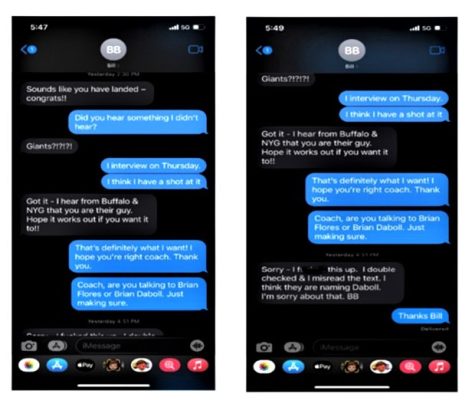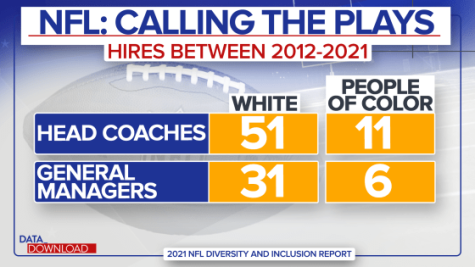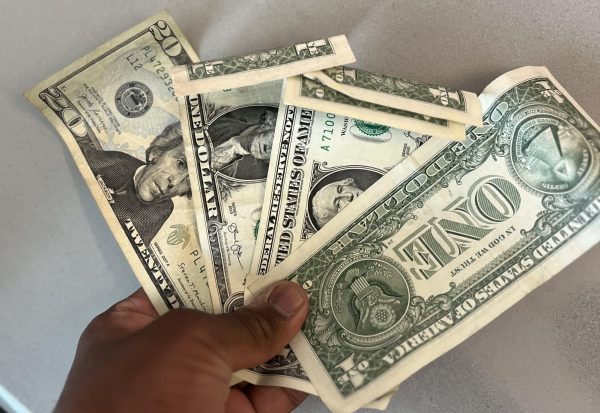Op-Ed: NFL coach Brian Flores’ lawsuit reminds Black Americans we have not progressed enough
Photo Designed by Jahrel Noble, Courtesy of Pro Mosaic
A mosaic of Brian Flores composed of photos from the NFL, Black History, and the personal life of Brian Flores.
On the night of February 13, 2022, I watched blue and yellow confetti rain down from the skies onto the field of SoFi Stadium when the Los Angeles Rams defeated the Cincinnati Bengals to win Super Bowl 56. Tears of joy streamed down the faces of fans, coaches beamed warm smiles at the cameras, and players shared tight embraces with their loved ones as they reigned in victory. The moment seemed perfect.
However, when the confetti was cleaned, and the field was left bare, it brought a less than perfect aspect of the NFL back into my mind and back into the headlines: the mistreatment of Black individuals in the league. The most prominent name in these recent headlines is Brian Flores, the man who was recently hired as a linebacker coach by the Pittsburgh Steelers despite his active lawsuit against the NFL for racial discrimination. Flores is suing on the basis of discriminatory hiring practices against Black coaching candidates, which stemmed from the supposed “sham” interview he was offered to satisfy the NFL’s, Rooney Rule.
The Rooney Rule, instituted in 2003, requires NFL teams to include minority candidates in interviews for leadership positions. The NFL adopted the rule after a study found that Black NFL coaches were more likely to be fired and less likely to be hired even though statistically, Black head coaches had a higher winning percentage than their white counterparts. Although the NFL implemented the rule to promote more diversity in coaching positions nearly two decades ago, progress has been minimal. In 2003, there were three minority head coaches. Fast forward 19 years later in 2022 after Brian Flores was fired by the Miami Dolphins and there are still only three active minority head coaches, even though 71% of the league identifies as people of color
At the end of this January, Flores was seeking to land a new head coaching position. He had an interview scheduled with the New York Giants when he received a peculiar text from Patriots head coach Bill Belichick. The text congratulated Flores on “landing” the Giants head coaching job, which was impossible as the interview had not yet taken place. After much confusion, Belichick revealed that he had made a mistake as the Giants head coaching position went to another Brian, Brian Daboll. Although Flores was qualified for the job, he was never given a real shot at becoming the head coach of the Giants as the decision had already been decided before Flores’ interview. Instead, Flores was given a sham interview to fulfill the quota established by the Rooney Rule, further emphasizing the prolonged mistreatment of Black figures in not only the NFL but the United States as a whole.

The Rooney Rule is just a singular example of the large set of rules and legislations put in place by institutions across America to promote inclusivity and push towards racial progress. Still, the recent conflict with Flores brings a particular question into the light: How much racial progress has actually been made throughout this country’s history?
As Black History Month recently ended, I reflect on what the month means to me, and other Black individuals; I find that the connection between Black History and the aforementioned lawsuit cannot be more apparent. Flores was born in 1981, a time where Black culture was reaching new heights by the day as Black individuals were starting to be recognized for their excellence in entertainment, literature, sports, and more with the likes of Michael Jackson, Gwendolyn Brooks, Whitney Houston, and Mike Tyson setting new standards in their respective industries. Still, the era that Flores grew up in was not a perfect America by any means, especially with respect to racial issues.
Flores himself came from humble beginnings, growing up with his four brothers in a poor section of Brooklyn known as Brownsville. As an Afro-Latino male with immigrant parents from Honduras, Flores has always been familiar with racial issues. In spite of everything, Flores continued to dream big, eventually seeing these dreams transform into reality due to the incredible amount of work he put into his passion: football. From age 12 and onward, Flores was enamored with the intricacies of the game and he caught the attention of those around him as he displayed high levels of skill and knowledge. Flores got a scholarship into Poly Prep School in Brooklyn, paving the way for him to matriculate at Boston College where he would continue playing football as a linebacker until 2002. Unfortunately, he suffered an injury that halted his dream of playing in the NFL. However, he was still able to become a scouting assistant in the NFL in 2004 before ascending the ranks to the top. It is through this that he got to the point where he is at today, facing off against one of the country’s largest sports entities.
Flores’ situation speaks to a much larger and more complex issue in society. It is clear that Flores was qualified to at least receive a real interview from the Giants, but that was not the case. In our country, Black people are often told that we must work twice as hard to get as far as others and in the case of Flores (and other Black coaches in the league), this does seem to hold a degree of truth. The story of Flores is one that mirrors the typical “American Dream”, a first-generation immigrant climbing up the socioeconomic ladder thanks to the opportunities and resources afforded to him from living in America. However, the “American Dream” does not seem too dreamy for Flores in this moment of time and it raises yet another question: How attainable is the American Dream for Black people in this country?
While I do believe the American Dream is in reach for everyone, I also believe that due to the convoluted and dark history of this country, it is more difficult for Black individuals to attain. Progress has certainly been made, but Black people in this country still end up on the backend of racial disparities and mistreatment on both a micro and macro scale. To see this, one can look no further than the NFL. As mentioned earlier, 70-71% of the NFL identifies as people of color. However, from 2012-2021, 82% of head coaching hirings and 83% of general manager hirings have gone to white individuals.

These disparities also persist in other realms. Black women have a maternal mortality rate (pregnancy-related deaths per 100,000 live births) that is approximately three times higher than white women. Black women and men have a shorter life expectancy than other races. Black median household income trails other racial groups. Black people are more likely to be incarcerated. And of course, Black people are more likely to be offered a sham interviews with no intention of hiring, just like Brian Flores . No matter how many quotas or rules are put in place, it often feels that we are at a standstill. Instead of real progress, we are provided with flowery words on an Instagram post and seemingly well-intentioned laws that always end up on the wrong side of a loophole.
But many would argue that this is a foolish, ignorant, and perhaps even an ungrateful stance. A century ago, as a Black man, I would not even be allowed to voice my opinion in a manner like this. So, how is it possible that I can complain about the racial progress the United States has made since? To those who beg this question, I offer another question as a rebuttal: should we not always strive to progress even further than where we currently are? Is a primary goal of our lives not to become better individuals and thereby better society in some shape or form? I am not, and will never say that there has not been significant racial progress in the United States and I am eternally grateful for the progress that has been made. However, I firmly believe that the battle for progress is not (and should never be) over, and clearly, I am not the only one who thinks this.
According to a study done by Pew, just 19% of surveyed Black adults said the United States had made a lot of racial progress, while 64% said the country had made a little progress. On the contrary, the study found that 64% of White adults believe our nation has made a lot of racial progress.
Our country is over 240 years old and racism has persisted as an issue throughout. To suggest that this issue has a singular solution that will magically resolve the racial tension that exists would be unwise and unrealistic. However, in order to help, those who are in leadership positions need to be held more accountable for adhering to the laws that are put in place. Symbolic victories should no longer suffice in 2022, and accountability with tangible consequences should alleviate the issue. Regarding the Brian Flores lawsuit, there are measures that the NFL could take to reduce the problem. As another source has suggested, increasing Black ownership, enforcing hiring policies, incorporating opinions of all players, unionizing, and creating player-to-coaching pathway programs could go a long way in making the NFL less prone to another situation similar to Flores’.
In order for this to occur, it takes effort from not only the people in leadership roles but also us in our individual communities and day-to-day lives. Microaggressions, racial comments, and insensitive jokes can begin to take a toll on the mental health of some Black people, and these comments also contribute to anti-Black behavior. In my life, I have dealt with a multitude of these comments: I must have been “fake Black” because of my academic performance, I “couldn’t be seen” when the lights were turned off in a room, or my hair was “so fun to mess with”. These stifling words rolled so effortlessly off the tongues of those who they came from, but the same words have echoed in my head years later, proving that the effects can linger for many people.
Our generation is the generation of the future and one day, we will be the ones holding these crucial leadership positions. Therefore it is important that we as a society continue to actively learn how to be anti-racist. We must ensure that we are not complacent in our current situation with racism in the country and instead, must strive to become better or society will be lost. We do not have to abandon entertainment sources and sports leagues like the NFL, but we must think critically and be cognizant of the flaws that exist in everything we consume. Figures such as Brian Flores must serve as a reminder of the progress we have made in the United States so far, but also the progress that still must be made in the future.
Your donation will support the student journalists of Carnegie Vanguard High School. Your contribution will allow us to cover our annual website hosting costs and fund field trips, competition fees, and equipment. We appreciate your support!

Hello! My name is Jahrel and I'm a Senior at CVHS. Some things I enjoy are traveling, writing, and playing with my two dogs.






